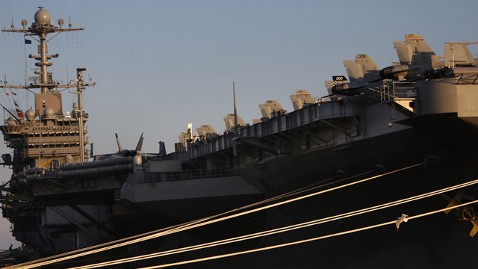Pentagon Delays Carrier Deployment Because of Budget Uncertainty

AP Photo/The Virginian-Pilot, Stephen M. Katz
The budget uncertainty in Washington has led Defense Secretary Leon Panetta to indefinitely postpone the deployment of the aircraft carrier USS Harry S. Truman to the Middle East. The delay also means that the Navy will now have to keep one carrier in the region as opposed to the two-carrier presence it has maintained there the past two years.
The carrier and the cruiser USS Gettysburg were to have deployed this Friday from their home port of Norfolk, Va., for a six-month deployment to the Middle East. A Defense official said halting the carrier's deployment will save the Navy several hundred million dollars over the course of the year.
Pentagon spokesman George Little announced the delay in a statement, saying Panetta had approved it at the Navy's request.
"Facing budget uncertainty - including a continuing resolution and the looming potential of $600 billion in across-the-board sequestration cuts - the U.S. Navy made this request to the secretary and he approved," said Little.
He added, "This prudent decision enables the U.S. Navy to maintain these ships to deploy on short notice in the event they are needed to respond to national security contingencies. "
The delay in sending the carrier is the most tangible sign that the military's operations could be affected by the automatic defense spending cuts that would be triggered on March 1.
Regardless of whether those cuts occur, the Pentagon's operations are also being stretched because it is still operating without a funding bill for the fiscal year. Instead, it, like the rest of the federal government, is being funded by temporary funding measures known as continuing resolutions.
In a speech at Georgetown University earlier Wednesday, Panetta urged the Congress to work together to ease the gridlock on Capitol Hill and avoid potential national security risks that could arise from the sequestration cuts. According to Panetta, the "pervasive budget uncertainty" creates a "serious risk … that threatens our security and threatens our economic future."
In his remarks, Panetta warned that the cuts would affect the Navy's operations.
"We're going to have to shrink our global naval operations with the reduction of as much as one-third in our Western Pacific naval operations," he said. "This whole idea about trying to rebalance will be impacted."
He added that training and maintenance cuts could put two-thirds of the Army's brigade combat teams outside of Afghanistan "at a reduced readiness level." Air Force flying hours and weapons systems maintenance would also be cut, putting some units "below acceptable readiness standards by the end of the fiscal year."
In preparation for sequestration, the Pentagon has already instituted a hiring freeze and authorized the layoffs of 46,000 temporary workers. Panetta warned that if sequestration takes place, the department's 800,000 civilians will have to miss as many as 22 days of work and could face a 20 percent cut in their salaries.
The Navy has had a near-continuous two-carrier presence in the Middle East for much of the past two years. But this past December, a delay in maintenance work on the USS Nimitz forced the Navy to reschedule its carrier deployment schedule and to temporarily reduce to one the number of carriers deployed to the Middle East. The indefinite delay in the Truman's deployment means there will be a one-carrier presence for the remainder of this year.
Typically, one carrier would conduct operations inside the Persian Gulf while the other is stationed in the Arabian Sea providing air cover for American and NATO troops in Afghanistan.
Because the Truman and its crew of 5,000 had already been trained and qualified for their deployments they will be available to the Navy as a "ready deploy" carrier should they be needed.